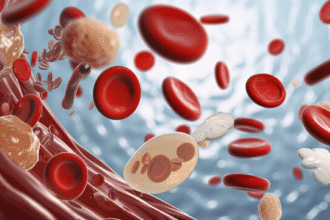Mr. Wang’s Wake-Up Call
Mr. Wang, a 52-year-old accountant, prided himself on late-night spreadsheets and weekend golf. When he began waking at 3 a.m. parched and exhausted by midday, he chalked it up to stress—until his vision blurred and he dropped 5 kilograms in two months. A routine checkup revealed high blood sugar. His diagnosis: type 2 diabetes. Suddenly, he faced a condition that could affect every organ in his body. But with information, small habits, and support, Mr. Wang discovered he could reclaim his energy and health.
What Is Diabetes Mellitus?
Diabetes mellitus is a cluster of metabolic diseases where the body either cannot make enough insulin—an essential hormone that moves sugar (glucose) from blood into cells—or cannot use insulin effectively. Without proper insulin action, glucose accumulates in the bloodstream, causing hyperglycemia and spilling into urine (glycosuria). Over time, high sugar levels disrupt fat and protein metabolism, leading to weight loss, fatigue, and long-term damage to blood vessels and nerves.
How Common Is It?
Globally, more than 135 million people live with diabetes. Prevalence varies from about 2% in some regions to over 10% in areas with high obesity and aging populations. In countries experiencing rapid lifestyle changes—higher-calorie diets and sedentary jobs—diabetes rates climb fastest. Understanding its reach underscores why early detection and daily self-care are vital.
Why It Happens: Genes, Immunity, and Lifestyle
Diabetes arises from a complex interplay of genetic and environmental factors:
-
Type 1 Diabetes involves an autoimmune attack on pancreatic cells. Studies show up to 50% concordance in identical twins, and certain HLA genes increase risk. Viruses—like coxsackievirus—may trigger the immune system, leading to destruction of insulin-producing cells. Over 90% of new patients test positive for islet cell antibodies, painting a clear picture of autoimmunity.
-
Type 2 Diabetes is driven by insulin resistance (cells ignore insulin’s signal) and gradual insulin deficiency. Genetics play a big role: if one twin develops type 2, the other has up to a 95% chance of developing it within five years. But lifestyle accelerates risk—obesity, high-calorie diets, and lack of exercise overwhelm your pancreas’s ability to keep blood sugar in check.
Spotting the Signs
Early symptoms can be subtle but shouldn’t be ignored:
- Polyuria & Polydipsia: Frequent urination and unquenchable thirst.
- Polyphagia & Weight Loss: Constant hunger yet dropping pounds.
- Fatigue & Blurred Vision: High glucose can sap energy and affect eyesight.
- Slow Healing & Infections: Elevated sugar impairs circulation and immunity.
If you notice these signs—especially with risk factors like family history or overweight—ask your doctor for a blood sugar test.
Diagnosing Diabetes
- Fasting Plasma Glucose: Measures sugar after an 8-hour fast.
- Oral Glucose Tolerance Test: Checks blood sugar response to a glucose drink.
- HbA1c Test: Reflects average blood sugar over the past 2–3 months.
Early diagnosis leads to interventions that protect your heart, kidneys, eyes, and nerves from long-term complications.
Managing Diabetes: Tools for Success
Medications
- Type 1: Insulin injections or pumps are lifesaving.
- Type 2:
- Metformin reduces liver glucose production and improves insulin sensitivity.
- GLP-1 agonists and SGLT2 inhibitors not only lower blood sugar but also support heart and kidney health.
- Insulin may be needed if other treatments don’t achieve targets.
Lifestyle Strategies
- Balanced Meals: Emphasize whole grains, vegetables, lean proteins, and healthy fats. Track carbohydrate portions to prevent spikes.
- Regular Exercise: Aim for 150 minutes of moderate activity per week—brisk walking, cycling, or swimming.
- Weight Management: Even losing 5–10% of body weight can improve blood sugar control.
- Stress Control: Practices like meditation, yoga, or hobbies reduce stress hormones that raise blood sugar.
Myth vs. Fact
| Myth | Fact |
|————————————–|——————————————————————–|
| Eating sugar directly causes diabetes. | Diabetes involves insulin function, genetics, and many lifestyle factors. |
| Carbs are off-limits for diabetics. | Choosing complex carbs and controlling portions is sustainable. |
| Insulin means treatment failure. | Insulin protects organs when other therapies aren’t enough. |
| Only the elderly get type 2 diabetes. | Type 2 is rising in young adults, and type 1 can occur at any age. |
Frequently Asked Questions
Q: Can I reverse type 2 diabetes?
A: Early-stage type 2 can enter remission through significant weight loss, diet changes, and exercise.
Q: How often should I test my blood sugar?
A: It depends on your treatment: insulin users often test multiple times daily; others may check less frequently. Follow your healthcare team’s advice.
Q: What complications should I watch for?
A: Monitor for heart disease, kidney issues, vision changes, and nerve problems in your feet. Regular check-ups are crucial.
Resources and Support
- International Diabetes Federation: https://idf.org
- Chinese Diabetes Society: http://www.diabetes.org.cn
- Local diabetes education programs and support groups: Ask your healthcare provider.
Take Charge Today
Diabetes is widespread but manageable. With knowledge, daily habits, and a supportive care team, you can protect your health and live vibrantly. Start by setting one small goal—swap soda for water or walk for 10 minutes today. Every step counts!







